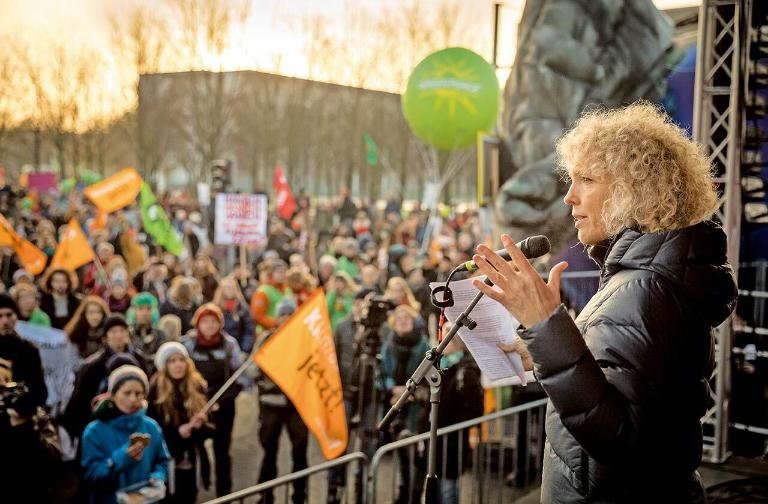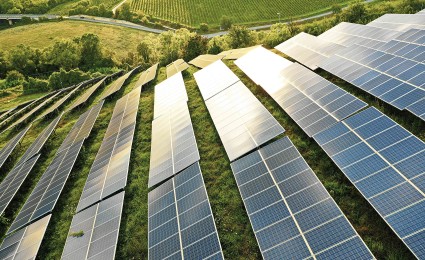

Sustainability in a business context: Insights from one of the leading climate activists
By Hannah Zühlke and Christian Böhler
Interview with Jennifer Morgan, International Executive Director of Greenpeace
Jennifer Morgan is International Executive Director of Greenpeace, the best-known environmental NGO in the world. She has been campaigning against climate change for more than two and a half decades. We asked her what she thinks the world will look like in 2050, what role businesses, governments and NGOs can play, and where her personal motivation comes from.

More and more companies are now integrating sustainability into their corporate strategy. Are we on the right track?
Unfortunately, no. We have seen that voluntary initiatives, where companies themselves try to integrate sustainability , do not work well. Often, they lack transparency. You just need to look at where the world is right now to know that this approach is not working. Look at biodiversity loss, climate change or emissions, for example. Or deforestation: In 2010, companies at the Consumer Goods Forum committed to ending deforestation in their supply chains by 2020. While some have done more than others, that target is far from being met. Between 2010 and 2020 at least 50 million hectares will have been destroyed, mostly for the production of materials. The integration of sustainability into corporate strategies is a long way from where it ought to be.
If we continue along our current path, what do you think the world will look like in 2050?
The world will not be a very nice place to live in. According to different projections, we are currently on a pathway to at least 3.2°C warming by 2100. That will have dramatic consequences, such as millions more people on the move. And it is almost always the vulnerable that are impacted the most. We will likely see more displaced people within countries, and more refugees. With four degrees warming, you're looking at 1.8 billion additional people at risk of food insecurity. Water scarcity, extreme weather events – the world will be a very insecure, unstable and, I'm afraid, even more inequitable one than the world we live in now. It will be a world where those who are wealthy are able to get on spaceships and go to the moon, while those who are poor will lack even basic healthcare. Research into the link between actions by companies and climate change is growing. In the future, I believe that companies will be held more liable for the damage that they cause.
If you could wish for anything, what three actions would you want companies to take right now?
The first would be to completely change their current paradigm, for them to put wellbeing ahead of unlimited growth. Once you put people at the core of your operations, the limits of our planet suddenly become much clearer. This paradigm shift would make a tremendous difference to our planet. It would change the way we work and think, but at the same time would still provide value to shareholders.
The second step would be for companies to drastically reduce their fossil fuel dependency and invest in upstream solutions. Companies need to stop investing in end-of-the-pipe solutions that just transfer the problem somewhere else.
The third thing would be for firms to put transparency and accountability at the core of their business models. Businesses need to become fully transparent about their commitments, across all scopes of their business – scopes 1, 2 and 3. At the moment, companies sometimes pledge to do one thing, but then work through business associations to actually undermine any regulation that would move in that direction. Accountability and transparency is a way of empowering consumers who want to create a better planet. It enables healthy relationships between companies, governments and citizens.
Do we need stronger regulation in order to become sustainable? Or will society lead the way?
There is no doubt in my mind that we are going to need more regulation. Time has run out. We need to halve global emissions within the next eight years – that's a reduction of seven percent a year – in order to save millions of lives. This is not the responsibility of individuals alone. In conversations I've had with companies, they tell me that they want governments to provide more clarity about the targets and make them legally binding. They want policies that are "long, loud and legal!" That's where innovation and competition come in.
In France, our office has put forward the idea that companies should be required to have binding targets, many of them based on scientific research. A legal framework can be incredibly effective. One suggestion is that payouts to shareholders should depend on binding targets being met. I believe that we're beyond anything else at this point in time.
With political tensions rising in many countries, how do you perceive current regulation and collaboration between governments?
The atmosphere is what it is: You can't negotiate with it. Countries and companies that develop solutions early on aiming at 100 percent renewable energy and a closed loop economy will enjoy a massive competitive advantage. That's why you see automotive companies in California trying to stay in line with the regulations and actually suing the Trump administration. In Europe, initiatives such as the Paris agreement can withstand some of the knocks dealt to it by irresponsible policies from the Trump administration. We need a fundamental shift in mindset so that we no longer ask whether we have to do this, but when and how. The automotive industry in Germany is a perfect example. People have been saying for years that the industry needs to move out of its "defensive" position, because it will be more expensive in the end. Unfortunately, the industry has held on as long as possible. And now it finds itself at risk. That's not good for Germany, it's not good for the workers, and it's not good for the companies themselves.
How will the role of environmental NGOs such as Greenpeace change in the future? Will we see more collaboration with businesses?
I think there will be more collaboration between different movements. People fighting for certain causes – be that human rights, racial justice, the environment or workers' rights – often share similar perspectives. They can become stronger by working together. I think that as it becomes clear who is responsible for the damage we see, it will be very difficult for NGOs to sit on corporate boards.
Right now, I see three groups of companies. The first, mainly small and medium-sized enterprises, seems to understand and care. They want to contribute and play a positive role in society. Here you can see, even at a local level, different types of collaboration happening in a creative way as businesses work together with civil society.
The second group of companies understands the science and the importance of a fundamental change of course, but they're not yet quite sure how to do it. I am convinced that where these companies will be in 2050 will to a large extent determine whether we avoid the highest temperature thresholds or not. If these companies start listening more to society and put smart policies in place, we can still avoid the worst.
The third group are companies that simply follow their vested interests, holding on to what they have and blocking any progress. If the second group of companies join the ranks of the third group, then we really have a problem.
At Greenpeace, have you seen any increase in "greenwashing" by companies?
Yes, absolutely. Greenwashing comes in different shapes and sizes. Sometimes it's well-meaning, but often it's not. Misleading labeling in order to suggest sustainability is one example of how consumers are led astray. That's why we need governments to come in and help create a level playing field. We need to have a conversation between government, civil society and business about what will lead us to a stable and sustainable future.
You mentioned that companies need to be more transparent in order for us, as a society, to move forward. How do you see the role of ESG frameworks in driving sustainability?
There are good things about ESG, but it doesn't challenge companies to make the fundamental shift to putting wellbeing first. It nibbles around the edge of the existing growth paradigm, but it doesn't really get to the core of it.
How do you perceive the involvement of Generation Z?
Many members of Generation Z are extremely engaged and committed to societal issues, from racial justice and inequities to climate change. In many countries we see young people being incredibly courageous. I think they show a higher level of courage and engagement than the generation before them. They are not afraid to speak out, and soon they will be able to vote. The challenge with sustainability issues is that action is needed urgently, right now. I sincerely hope that we do not leave this to the next generation. We would be passing such a mess on to them that all they will be able to do is mitigate some of the problems rather than pushing ahead with their own initiatives. But I get optimistic when I see all those young people out there, uniting behind a cause, confronting companies and governments. That is uncomfortable to do and takes a lot of courage.
You have campaigned against climate change for more than 25 years. What gives you the energy and hope to continue?
I am very lucky to work in an organization that works closely with people. Everyday I get messages on my desk about the changes that individuals and groups are pushing for. In Poland, for instance, local communities are coming together to stop coal mines being built in their towns. The level of engagement and activity around the world gives me great hope everyday, and I often think it doesn't get enough visibility or media attention. There are millions of people out there trying to create a better world. I'm really inspired by them.
Do you think that the COVID-19 crisis could trigger a further push for sustainability? After all, the pandemic has shown that governments and companies can act quickly and decisively if they want to.
Certainly. COVID-19 has shown that countries that listen to their scientists and respond appropriately, based on facts, fare the best. The same should be true for climate science. The pandemic has shown how quickly we can move if necessary, especially if people understand that it's for the sake of their health. Clearly, there will need to be major shifts by 2050. My sense is that we will pass massive tipping points. Who knows, we might have to go into a "climate lockdown" in which we can't build pipelines or drive our cars. COVID-19 has helped us understand that the current lockdown and restrictions might be nothing compared to the situation we may face in 2050. And then there's the question of money: There are not going to be billions or trillions flowing into the economy any time soon. I believe that COVID-19 has created a huge opening – I don't like to say "opportunity" because of the terrible losses that the disease has meant – but there is a huge opening for a shift in mindsets about what is important. Is it more important to buy the cheapest thing you can, or to see the people you love and hug them?









